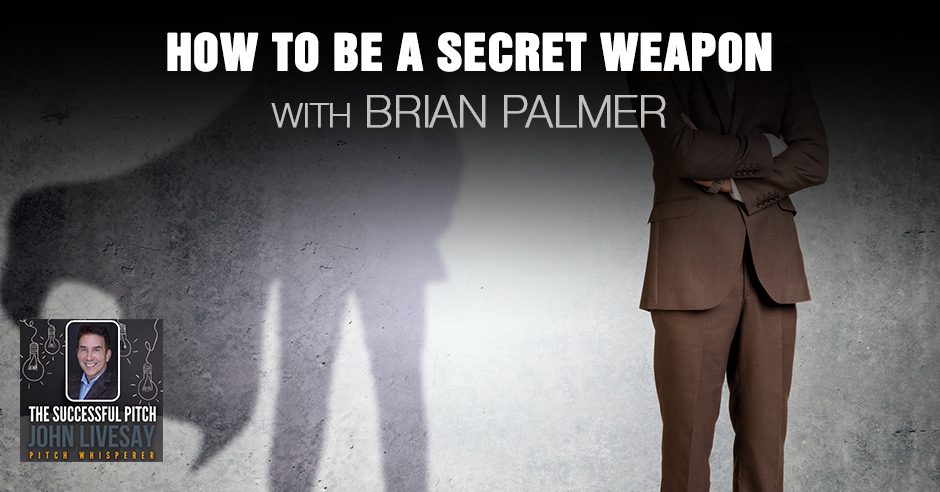How To Be A Secret Weapon with Brian Palmer
Posted by John Livesay in podcast0 comments
Episode Summary:
Loyal customers are repeat customers and they surely help in keeping the business running. It doesn’t take a lot to gain loyal customers, but oftentimes in people’s desire to prioritize big fat sales over putting their customers’ need ahead of their own, what is essential is often missed out. Brian Palmer, Senior Vice President at National Speakers Bureau, shares how he has been referred to by his loyal customers as their “secret weapon.” He talks about important lessons that he picked up and learned in his journey where his father served as his guide and influence.
—
Listen To The Episode Here
How To Be A Secret Weapon with Brian Palmer
Brian Palmer began working for National Speakers Bureau part-time in 1972. His father, John Palmer, founded the firm. He became full-time in 1980 and assumed the presidency in 1996. He’s held roles with some of the event industry’s most significant organizations and knows the meeting industry inside out. One of the most important things his clients, coworkers, family and friends know about him is that he sleeps well at night. He’s a man of his word who cares to help his clients succeed, and he’s equipped to do so. He and his violinist wife, Paula, have two children, Adam and Rachel. Brian is also an avid racing enthusiast who built his own car. Brian, welcome to the show.
Thanks, John. I’m glad to be here with you.
One of the things that resonate with me about your background and having the pleasure of getting to know and work with you is that you are a man of your word. I want to ask you to tell us about your own story of origin. Your father was a huge influence on you. Was it always assumed that you would be in the business and how did you learn integrity?
It wasn’t always assumed that I would be in the business. My dad was a musician. He was a bandleader and he traveled all over the country. He got tired of traveling. In some ways, the speaking business is on the fringes of the entertainment industry or was perhaps more so then. He started the company. I was good at licking envelopes, so he enlisted my help. I was in high school then. I began helping in the summers while I was in college. When I finished college, I started here full-time. My dad often spoke of how our customers are putting on these events. They spend hundreds of thousands or even millions of dollars to bring people together. They have a purpose for these gatherings. It’s that purpose which should drive the recommendations we make, not an obligation to fill somebody’s calendar. As expensive as a speaker can be, the most valuable component of that session is the cumulative time of everybody sitting in there and the objectives that the organization has in place. He said, “There’s no room for exaggeration or anything other than the audience and the organization’s objectives and have that be your sole guide. Always tell the truth about your recommendations and the speakers’ capabilities and you’ll be in business for a long time.” He was right.
That’s so valuable for people to take away whether you own your own business or work for someone else. One of the keys to success is this ability to build trust. That comes from what you described, which is a sense of putting someone else’s needs ahead of your own and delivering on what you say you’re going to do, which increases the trust and it keeps building from there. Would you say that’s been your experience?
It certainly has. One of the most satisfying components of the outgrowth of that are some of the men and women who have been customers for literally 40 years. I’ve been to a number of retirement parties, people that we’ve helped. People have said nice things along the way about how we were one of their secret weapons. It’s a powerful skill to be the person who always comes up with the excellent speakers that helped an event sing. There are a variety of components that go into that. Certainly, me doing the right thing and having a client’s objectives in mind is an important part of the longevity that many of our relationships have had.
[bctt tweet=”Avoid criteria creep.” username=”John_Livesay”]
We touched on a couple of things here that I find interesting. One, your father was a bandleader, you’re married to a professional musician and you used a word about making an event sing. Clearly, music and speaking have some similarities there about rhythm, what’s the melody and when you hear a good song or a good talk, there’s an emotional connection. Can you speak to how you see any similarities between music and the speaking industry?
If I might in a side, my wife and I, on our fourth date, she said to me, “By chance, did your dad go to Northwestern University?” I said, “Yes.” “Did he have a band when he was there?” I said, “Yes, he did.” She smiled broadly and said, “My dad played piano in your dad’s band in college.”
You were destined to be a couple, weren’t you?
Yeah, I think so. I could go on and on about stories about my wife. When a presentation connects with ideas that exist in the mind of the audience, when a presentation accounts for the objectives that an executive or an organization has for this meeting, there’s a certain symmetry that can take place there in the coming together or I’ll call it more of a harmony when it works well. It can often make a meeting sing, and a heart sing too. I also want to note that events certainly aren’t always designed as a key objective to make everybody feel good. People put on events to further some objective, whether it’s an organization or sales or recognition of a product. It’s not all that common that when we talk to people about their events, when we ask what they want to do, they want there to be some progress. They want there to be some learning. Often learning and progress as a key component of it or something that’s certainly present is a measure of discomfort.

Secret Weapon: Clients who book your talent have the purpose to bring people together. That purpose should drive the recommendations that you make and not just an obligation to fill your talent’s calendar.
Some of the best presentations often leave an audience quiet and thinking about what they might have to do to accommodate this new direction or this new path that the organization wants to take. While I pay a lot of attention to evaluations that audiences fill out for speakers, I’m usually most interested in what the event owners have to say about that speaker is delivering on, what they have. Usually, the higher-level executives have a higher-level set of objectives in mind. Sometimes lower-level people want everybody to be happy. A standing ovation can be and usually is a sign of a speaker that’s gone over well. Even when there’s a standing ovation, I want to listen to what the end-client has to say and perhaps whisper about how they felt about how the session went.
The other thing that you touched on that is a fascinating formula for people to take a look at their own lives and their own business, which is the integrity that you bring builds trust which equals loyalty. If I was to create a little formula of your success, Brian, that’s the formula I would come up with. I’m the Pitch Whisperer so I like to give people a one-sentence zingy memorable takeaway. Everyone can start looking at that saying, “If integrity plus trust equals loyalty, then that builds my bottom line because loyal customers are repeat customers and that saves you huge expense on marketing to get new business all the time. Loyal customers also give you referrals.” There’s a nice return on investment in addition to the feel-good, “They called me a secret weapon.” I wondered if you had a story of what you did for someone that made them want to call you their secret weapon.
There was one guy that retired. He was at four large financial services firms. I forget how we first came together, but he called and asked me about a speaker who I didn’t think was worthy of his meeting, someone who had a hit book that people loved, but he didn’t seem to care enough about the audience and the organization’s objectives. He was there essentially giving what I call a book report. That’s not what the client wanted. He called wanting that speaker. It would have been a nice fat sale. I dissuaded him from having that speaker. I recommended somebody who charged a good deal less. It went particularly well. That’s what led to my working with him in these four different roles. He’s the guy who referred to me as his secret weapon. He pretended that he didn’t tell other people about me, but he was a fantastic referrer. You could imagine somebody who’s in a senior role making that reference and referring to us that way, it was the genesis of a lot of wonderful opportunities.
[bctt tweet=”Be a secret weapon for your clients.” username=”John_Livesay”]
The takeaway here for everyone is when you put somebody else’s interests ahead of your own, the long-term benefits more than makeup for any short-term financial impact that might have. The fact that you were willing to recommend a more customized speaker at a lower fee than taking the higher fee commissions on a speaker that would have given a book report because it sounds boring. You could read the book out loud almost, that is what people say, “Now I trust you because you could have charged me more. I thought that’s what I even wanted. It wasn’t like you had to push me to buy this,” but you took the big picture, zoomed out and said, “I think you should go this route,” and that’s what built the trust which then built the loyalty that we talk about. That’s a great story for everyone to look at of all of that. This concept of who you say no to is as important as who you say yes to resonates with me.
That’s also a big-time saver. We’re not a retail store. We don’t have to serve everybody that walks in the door because a lot of people have needs that we can’t help where they have the expectations that I’m not going to be able to meet. Some of my biggest regrets in business were saying yes to things that I suspected weren’t a good fit and I spent a great deal of time trying to satisfy somebody who I originally suspected wasn’t going to pan out for them or for me. After sometimes weeks and months of effort, it turns out that initial impulse was right. I’ve gotten better and better, although I still make that mistake, I’ve gotten better at recognizing things that aren’t going to be a fit and saying no to people. Sometimes I’m wrong, but the net of that decision to avoid poor fits has probably served me well. I’m sure I’ve made a few mistakes, but it’s been positive.
This concept of when people call you a secret weapon, I had that happened to me with Gensler, a big architecture firm that hired me to come in and give a keynote talk on client relationships and developing stories that resonate. They weren’t just going in and giving book reports of their previous architecture work. I did a workshop to help them tell stories that would tug at people’s heartstrings and make them memorable compared to their competition. When the Co-CEO, Diane Hoskins, came up to me afterward and she said, “We’re going to have you speak to all the offices because you’re our secret weapon.” I’m like, “Okay.”
When you get that feedback, it’s because you’re giving such value. They see you’re solving a problem which is what I see in every industry, whether it’s technology or architecture or healthcare. It’s how do we stand out and not be seen as a commodity, therefore justify a higher premium price. Let’s zoom out into your world of speaking bureaus. How do you and did you create National Speakers Bureau brand that allowed you to differentiate yourself where people would want to work with you versus some of the other choices?

Secret Weapon: Be a strong believer of not just treating the customer well, but also treating the talent well.
I have to give my dad a lot of the credit. He had a lot of thoughts about entertainment and people who put on a good show and people who were good to work with behind the scenes. He was a strong believer in not just treating the customer well but also treating the talent well. He told the story more than once about pulling up to a venue on a bus and he said there were usually two types of venues. There was the one where the venue manager would come out and would welcome them and say, “Come on in, guys. We’ve got some cold drinks for you. I hope it’s okay but I ordered dinner. We’re going to make sure you guys are well-fed.” There were venues that when the bus would pull up, they’d come out. He’d wave the bus off and say, “Go park over there. We don’t want you in the venue until 8:00. If you have to use a bathroom, there’s a filling station right over there.” What place do you think the musicians would more eagerly play a little longer or be keener to play together better and play in tune better?
My dad would often talk about making sure that we treat the speakers well and treat them as the talent that they are. People became excited to do engagements for us and we got a lot of referrals from speakers because of that. They knew the client was going to be treated well and that the talent would be treated well and that would produce a better result. When I got out of college, my dad had been around at the founding of Meeting Professionals International. He had urged me to join the organization. I went to my first meeting. I was talking to everybody and I collected a fistful of business cards. I came back to the office. I held out that fistful of cards and I put it down on his desk. He looked at them. He took his trashcan and he pushed all the business cards into the trashcan. He said, “I don’t want you trying to collect business cards. I want you to go to those events to learn about the event business, to learn what’s of concern to meeting planners and meeting professionals because I want you to serve the industry and our customers better and then start worrying about getting business out of it.”
I remember he walked out of his office and I thought about it. I set myself on it on a different course, but I also went into his trashcan afterward. We were big supporters of the meeting industry. I was very involved in that association. I became President of the Chicago chapter and had a number of other roles. Setting out to learn about the role of the event owner and the event planner shaped the way that we operated, the offerings that we made and the ways that we went about recommending speakers, the contracting process and the very important execution or advancing of the actual engagements.
[bctt tweet=”Building trust is putting someone else’s needs ahead of your own and then delivering on what you say you’re going to deliver.” username=”John_Livesay”]
You’re also the contributing author of Professional Meeting Management and industry publications. What that tells me is that you understand the pain points or the problems at a deeper level than someone who’s not that involved where people are literally taking down their mask and being open and vulnerable with what they need. You’re hearing it firsthand so you can keep that in mind when you’re servicing them.
It’s hard to know exactly what influence all that industry work has contributed, but I think it has made a difference. It has made people in my company throughout the years more confident that we were doing the right things. It provided a bit of a fallback if something wasn’t going right and what’s at hand here. It helped us focus. It’s not about the sale. Somebody is paying all this money for the speaker to be there and all these people to be there, that has to be right. You don’t have a chance at 9:00 when that speaker is scheduled. He or she needs to have a bright, shining moment. If all the things that we did beforehand were focused on the wrong things, the odds are lower, that things would sing.
You made the decision to merge with the Premiere Speakers Bureau. Can you share with me some of the thoughts that went into that? A lot of people are often thinking, “I wonder if I should do that. Would I stay on if I did do that?” I bet there are some interesting stories there.
There are a lot of interesting stories for me, but the genesis of it was I came to work here right out of college. Other than jobs that I had in high school working at a gas station, painting houses and caddying when I was twelve, this is the only job that I’ve had. I’ve never been to a job interview. I always tell people that when they call and ask me for an interview advise. I’ve been here for 38 years. I don’t have retirement plans. I’m 61. I wanted to change. I gave thought to ways that I might be able to go about our business in a way that would be a change, but in a way that also would allow me to use my experience.

Secret Weapon: You go to business events not to collect business cards but to learn more so you can serve your industry’s customers better.
I looked around at the entities that existed in the marketplace, companies that went about their business in ways that I agreed with. I talked to Shawn Hanks at Premiere Speakers Bureau and relatively quickly, we came to a preliminary understanding. True to my expectations, the deal that we initially discussed and eventually worked out was very satisfying. It has allowed me to do what I enjoy and that is to listen to people’s objectives, make recommendations and provide them with the means on which to make a decision, have that speaker prepare and show up, do a great job and make event owners and most of the people in their audiences very happy. That’s rather simply the way I went about it. I thought about neither one of my kids is interested now coming into the business.
My kids are relatively young. One is still in college and one is a few years out of college. They like the business. I checked with them and neither one was interested now. I thought making this move would be helpful on the personal front and also in terms of the next chapter for me. I don’t have to worry as much about becoming 70 years old and wondering what I might be able to do with my business. That has been figured out. I’m enjoying working in a new entity, learning their perspective on the world and using their wonderful technology and their systems. There’s been a bunch of wonderful cross-pollination that I’ve found very satisfying. They’ve helped me and we’ve helped them. Premiere has always been impressed by the longevity of a lot of our relationships. They’re constantly asking questions how we did that. They’ve got a lot of long-term relationships too but they’ve been around 25 years. Our company’s been around 45 years. There’s a lot of experience there that’s coming together making a much stronger entity.
It sounds like there’s a great cultural fit. If there are lessons to be learned from both sides, which ultimately makes a great joint venture.
[bctt tweet=”Some of the best presentations often leave an audience quiet.” username=”John_Livesay”]
My boss, Shawn, is a wonderful guy. Do you know Shawn?
I do.
All my life I’ve read all sorts of books and articles about great bosses. I’ve got a great boss. I find myself wanting to be a good employee.
I’m sure he thinks of you as more than an employee and more of a partner. This show’s all about having a successful pitch, do you have any suggestions or can you share with us how you pitch a speaker that you’re representing?

Secret Weapon: We have two ears and one mouth so you can listen more. Listening is a key tool to make a persuasive pitch.
That all depends. I don’t have a standard pitch because it depends on the client and what they’re looking for, what their manner is. You can tell often when somebody wants you to be brief. You can tell when somebody wants a lot of details. Custom baking every pitch that we make I think is key. I don’t think sending somebody a bunch of links to spots on our website and saying, “Here are the speakers who I think would be right. Take a look,” that’s not very powerful. I don’t think recommending a lot of speakers for a particular slot is necessarily useful. Although sometimes people do want to take a look at a lot of speakers. There’s something that we call criteria creep, meaning people gave us criteria and we consider it and make recommendations. In the meantime, they’ve gone around the office or they’ve thought about this event, ask questions. That criteria might have evolved somehow.
I make sure that we in a proposal or a pitch that we reiterate what their criteria were so they’re considering my proposal in the context of the criteria we were given. It suggests to them that they were being listened to and it provides the rationale for these recommendations. You’ve probably heard this expression or this joke before. It’s a sign from God that we have two ears and one mouth. Doing a lot of listening is a key tool in making that pitch, one that is persuasive. Not just informative but persuasive because people don’t want to be informed. They want things to happen relatively fast. If you can discern how they want it and give it to them that way, find out what they’re going to do with it because sometimes a lot of speakers are hired by committees. There are some subtle ways that you might go about making your pitch to help that person that you’re dealing with more effectively pitch that speaker to the committee. You know hard it is for five or seven people to agree on one speaker?
The same thing ironically happens for the clients, whether it’s an architecture firm or a tech firm. There’s a committee of people that are deciding on their pitch. It’s no longer one decision maker. That requires everybody having a different skill set of getting committees to say yes. Is it having an inside champion convincing the other people, almost like a jury that you find works?
[bctt tweet=”You build a lot of credibility when you do a great job.” username=”John_Livesay”]
That can be a key tool but also coaching somebody to effectively manage the process. Often people call and they don’t have a bit of information about what the objective is for that session or the event. They just know they want a speaker. If you can give somebody the tools, coming up with a set of objectives and a process by which a speaker will be decided on. We’ve all been to meetings where somebody was good at that meeting. They knew how to run it. They knew how to listen. They knew how to manage a conversation. Doing that and helping people with that process can dramatically improve their ability to bring that decision to a close and produce success. Many of the readers might not be familiar with a gong show, but people sit around listening to a speaker with no basis for a decision, “Do I like this guy or not? No, let’s turn this off. Let’s look at the next preview video.” Helping people with a process and then allowing the pitch to be a fit into that process is one of the keys to making a pitch. It’s some pre-work and a lot of listening.
A lot of listening and avoiding criteria creep because the better you can get people to agree on the criteria and that it’s not changing, the closer they are to saying yes. Because once all those boxes are checked off on the criteria, it’s time to pull the trigger. Brian, I can’t thank you enough for sharing your worldwide wisdom with us. If people want to work with you to hire speakers, what website should they go to?
NationalSpeakers.com is our website. There are some very interesting people on there.
I’m honored to be one of them. I can’t thank you enough for being such a great guest.
Thank you, John.
Thank you.
Links Mentioned:
- Brian Palmer
- National Speakers Bureau
- Meeting Professionals International
- Professional Meeting Management
- Premiere Speakers Bureau
- NationalSpeakers.com
- Quantmre.com
Wanna Host Your Own Podcast?
Click here to see how my friends at Brandcasting You can help
Get your FREE Sneak Peek of John’s new book Better Selling Through Storytelling
John Livesay, The Pitch Whisperer
Share The Show
Did you enjoy the show? I’d love it if you subscribed today and left us a 5-star review!
-
- Click this link
- Click on the ‘Subscribe’ button below the artwork
- Go to the ‘Ratings and Reviews’ section
- Click on ‘Write a Review’
- JohnLivesay.com
- John Livesay Facebook
- John Livesay Twitter
- John Livesay LinkedIn
- John Livesay YouTube

